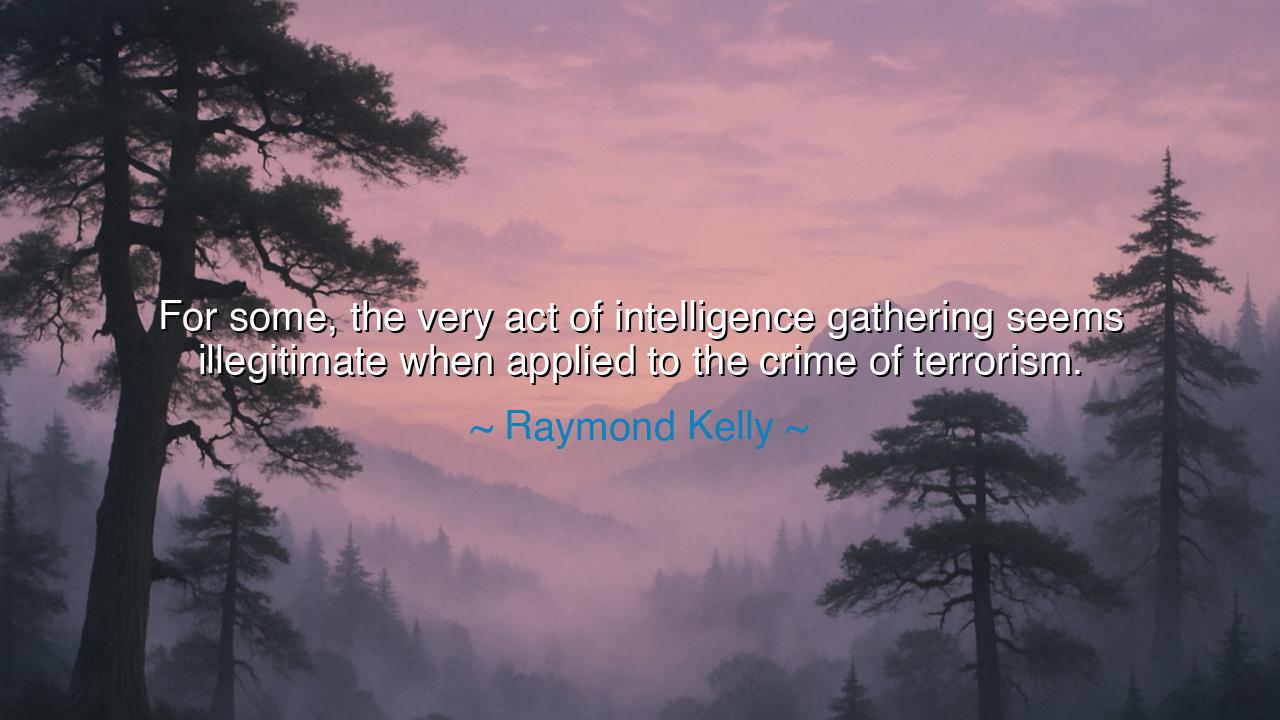
For some, the very act of intelligence gathering seems
For some, the very act of intelligence gathering seems illegitimate when applied to the crime of terrorism.






Hearken, seekers of discernment and justice, to the words of Raymond Kelly, a man who walked the thin and perilous line between freedom and security: “For some, the very act of intelligence gathering seems illegitimate when applied to the crime of terrorism.” In this observation lies a truth heavy with the weight of ethics, fear, and necessity — the eternal tension between the safety of a people and the liberty of their conscience. Kelly’s words are not a defense of tyranny, but a meditation on the difficult burden carried by those who must protect others in a world shadowed by deceit and violence.
Since the earliest days of civilization, rulers and guardians have relied upon intelligence gathering to shield their nations from harm. Even the ancients understood that knowledge is the first wall of defense, for one cannot guard against an unseen enemy. The Pharaohs had their spies; the Romans, their informants; the Chinese emperors, their networks of watchers across the Silk Road. Yet each generation wrestled with the same dilemma — when does vigilance become violation, and how far may one reach into the secrets of others in the name of safety? Kelly’s reflection dwells within this ancient paradox.
In the age of terrorism, this struggle has grown more complex. The enemy no longer wears the colors of a nation nor marches in formation. He hides in shadows, walks among the innocent, and strikes without warning. To confront such a foe requires foresight, subtlety, and intelligence — the ability to see before the strike, to know before the wound. Yet, as Kelly observes, there are those who recoil from this necessity, who see in surveillance and information-gathering not protection, but intrusion. To them, the act itself seems a betrayal of liberty.
Consider the story of 9/11, when the towers fell and the world awoke to a new age of fear. In the years that followed, intelligence agencies expanded their reach, striving to predict the unpredictable. Some called it security; others, overreach. In their grief and their vigilance, nations struggled to find balance between protection and privacy. The debate endures to this day — for the tools that can save lives can also erode trust if wielded without restraint. Kelly’s words capture the heart of this tension: the act of intelligence gathering is not inherently evil, but its legitimacy depends upon wisdom, transparency, and restraint.
In the ancient world, Sun Tzu taught that the greatest victory is won without battle, that to know the enemy is to defeat him before he strikes. Yet Sun Tzu also warned that such knowledge must serve the greater good, not the vanity of power. Here lies the eternal lesson: intelligence is sacred when guided by honor, but dangerous when guided by fear. The true guardian does not spy to control, but to protect; he does not collect knowledge for dominion, but for peace.
The deeper meaning of Kelly’s insight is this: societies must learn to hold two truths at once — that freedom and security are not enemies, but uneasy allies. To reject intelligence gathering outright is to walk blind into peril. To embrace it without moral compass is to invite tyranny. Thus, the challenge is not whether intelligence should exist, but how it should be governed — with accountability, integrity, and reverence for the rights it seeks to preserve.
Practical wisdom flows from this reflection. As citizens, we must remain vigilant both against the threats that lurk outside and the temptations of excess within. Demand transparency from those who govern, but offer understanding to those who must act in secrecy for the common good. As leaders, temper power with conscience; as citizens, temper suspicion with reason. The strength of a nation lies not merely in the walls that guard it, but in the trust that binds it.
Finally, let Raymond Kelly’s words stand as a reminder that in the realm of justice, the purest act is never simple. The guardian walks always between light and shadow, and his choices echo through the hearts of those he protects. May those who wield intelligence do so with humility, and may those who question it do so with wisdom — for in that balance, the freedom and safety of humanity endure together.






AAdministratorAdministrator
Welcome, honored guests. Please leave a comment, we will respond soon